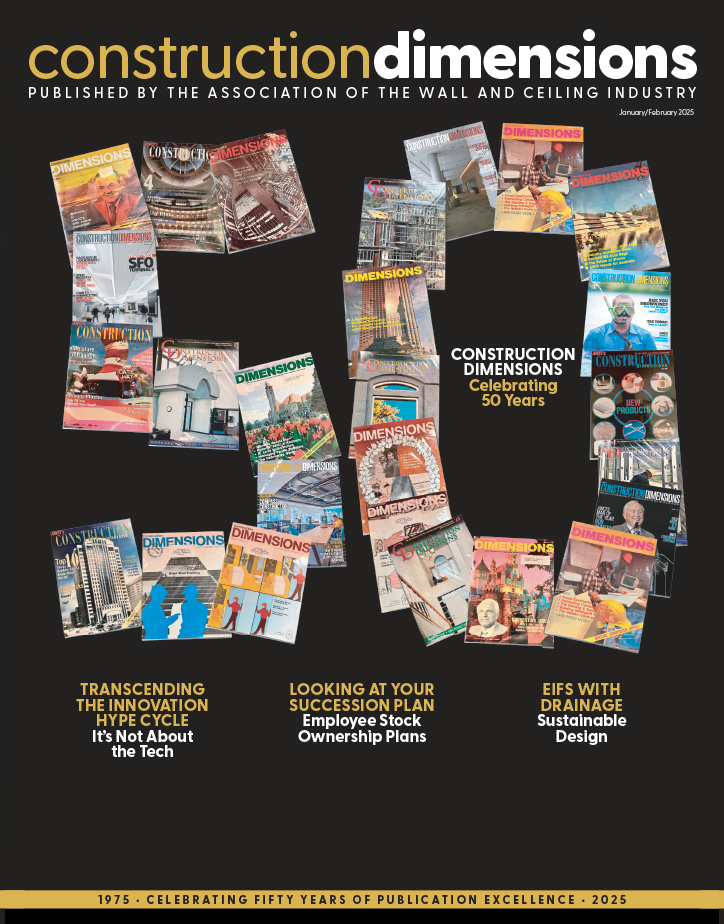Most estimators I know are, for the most part, a pretty durable bunch. It’s out of necessity that we endure a lot of mental and emotional challenges that would devastate a lesser sort. Torturously long hours, unyielding deadlines and high stakes are the daily realities that test us. Tack on the effects of the pandemic, and you’ve got a serious recipe for woe. And though I personally reject these currently popular notions of victimhood dictated by a therapeutic culture, I’ll concede that the constant pressures we quantifiers bear can certainly inflict a grievous toll on the body, mind and spirit. Moreover, I concur with the view that extended periods of months or years of occupational stress can result in a mental collapse of sorts—job burnout.
Aside from the above-mentioned maladies that are an integral part of an estimator’s profession, there may be factors peculiar to a particular firm that can aggravate normal tensions. For instance, having little or no influence on your workload options can be maddening. I know several well-known outfits that dictate the workload to their bean-counting subordinates with little knowledge or concern for their estimators’ capacity to accept and perform. Still others opt for a more reasonable approach by keeping a shared log of all opportunities (bid requests), allowing the stable of bidmeisters to choose for themselves according to their own time allowances.
Similarly, a dysfunctional workplace dynamic will undoubtedly exacerbate the inherent stresses of an exactimator’s lot. Micromanagement from above, an oppressive supervisor, an atmosphere of ethically questionable practices might all be factors that contribute to a buildup of inner tension. As might be expected, some of these negative conditions give rise to related problems—for instance, long hours at work, especially evenings and weekends, diminishes time spent with family and friends.
However, as I said, the victim mentality is for those who are too willing to surrender to their immediate circumstances. But there are proactive measures to ward off the demonic heralds of burnout. Read on
A tête-à-tête with the higher-ups. Talking with a superior about the troubling aspects of a job is the obvious first avenue. He may, for instance, be more than willing to allow a subordinate more input into shaping the bid calendar. A reasonable chief will recognize that his estimator can be the best judge of what volume he is able to assume effectively, and that he may have some valuable insight into what might be a good job to pursue versus what might be a waste of time. Of course, a reasonable chief would most likely have recognized all of this on his own. So a chat with the boss may or may not get results, but it’s worth a shot.
Get away from it all! Most bid activity comes in waves, so when the first signs of a trough appear, taking some vacation time is an excellent remedy for deflecting imminent burnout. If it’s affordable, a trip out of town with some planned activity is the best for putting the bid load out of mind. Fishing, hunting, skiing or exploring any new surroundings are all great activities for cleansing the skull of those job-related demons and for reinvigoration.
Anxiety remedies. Some small measures can make a big difference in making a difficult work situation more tolerable. I know it sounds trivial, but regular exercise can be a great stress remedy, and it can help to ward off any stress-related physical ailments, such as heart disease and elevated blood pressure. Cultivating friendships in the workplace can also provide a valuable defense against despair. There’s nothing like a sympathetic ear for releasing frustrations, and only a colleague who is personally familiar with the particular grievances can commiserate thoroughly. If friendly work relationships are not available, professional counseling can be a life saver—maybe literally. One other device that works well for me involves keeping the lines between work and home very well-defined. That is why in every job I’ve ever worked, I’ve declined the offer of a laptop and opted for a desktop computer. I would much rather spend a little extra travel time if I have to work a Saturday to meet a deadline than have that little heart-attack machine in my house at night.
Bail out! This is the most drastic measure, and of course it should be a last resort, but if none of the remedies above are cutting it, maybe it’s time for a change. More often than not, the conditions that give rise to a toxic workplace are intractable. In such cases, there is no reason not to explore the possibility of greener pastures. For some, that long-considered transition to retirement might be a timely alternative to being miserable every day.
I believe job burnout can be a very real pitfall for some estimators who are dealing with negative conditions that exacerbate those stresses we know are inherent in the work. I also believe there are good remedies to minimize the effects of those conditions. However, I strongly suggest that frustrated and undervalued estimators who have exhausted such remedies should put an ear to the ground—there are other opportunities out there.
Vince Bailey is an estimator/project manager working in the Phoenix area.




